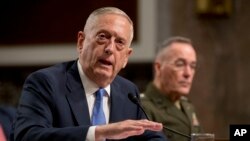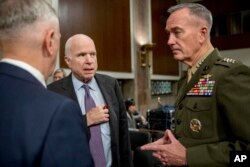Afghanistan security forces are fully engaged in offensive combat operations for the first time in their war against al-Qaida and Taliban militants, U.S. Defense Secretary Jim Mattis said Tuesday.
“For the first time in 16 years, we have all six Afghan army corps on the offensive at the same time,” Mattis told members of the Senate Armed Services committee during a hearing on the Trump administration’s new Southeast Asia strategy.
While Afghan forces are taking heavy casualties in the fight, Mattis said they are suffering fewer casualties than they did last year, a sign that could point to the forces’ improving battlefield capabilities.
Under President Donald Trump, the defense secretary said international forces have carried out more airstrikes against enemy forces than any other year since 2012, thanks to removing proximity restrictions that prevented airstrikes on insurgents who were not within a certain distance from American or Afghan forces.
The new Afghanistan strategy announced in August adds about 3,000 American troops and additional NATO coalition partners to the Afghan fight, the bulk of who will advise and assist Afghan forces down to the brigade level.
“Afghan special forces that have our trainers, they have won every time they fought the enemy. Those without have not won,” said Mattis.
He added that this will allow Afghan forces to be “bolder” in combat, knowing that American and NATO air power will be there to strike the Taliban and other militants wherever they are on the battlefield.
“When they go into the fight, no longer will they worry about the high ground. Having fought in mountainous country, it’s unpleasant to have the enemy above you," he said. "NATO airstrikes overhead denies the enemy ever having the high ground."
Still, despite the progress in supporting Afghan forces, Joint Chiefs of Staff Chairman Joseph Dunford told lawmakers Tuesday that Afghanistan and members of the coalition supporting the Afghan government are not close to bringing a “successful political solution” from military pressure - a lack of progress criticized by Vietnam prisoner of war and former Republican presidential candidate John McCain.
“After 16 years, should the taxpayers of America be satisfied that we are still in a stalemate? I don’t think so,” Senator McCain said Tuesday. He was referencing comments by the top commander on the ground earlier this year asking for thousands more international troops to help break the “stalemate” in America's longest war.
Chairman Dunford added that the international effort must be “long-term,” saying it will take at least six or seven years to transform the Afghan air force into the fully capable attack weapon needed to fight enemy forces in the country.
Mattis said that political reconciliation with the Taliban is still the goal, as long as they stop killing people, live by the Afghan constitution and break with international terrorists.
Pakistan and Russia
The new Afghan strategy aims to focus on major players in the region, including India, China, Russia, Iran and Pakistan. U.S. leaders have expressed frustration over Pakistan's seeming unwillingness to prevent terrorists from using their territory to escape pressure in neighboring Afghanistan.
Mattis on Tuesday said it will be "highly difficult" to sustain any stability in South Asia unless terrorist safe havens are removed.
When asked about the Pakistani Inter-Services Intelligence (ISI) agency's support of terrorists, Dunford told the Senate committee that was "clear" that the ISI has connections with terrorist groups.
Thus far, the United States has been working unilaterally to push Pakistan toward removing its terrorist safe havens, but Dunford stressed that America should utilize the nearly 40 nations of the coalition in Afghanistan, along with other regional powers China and India, to better motivate Pakistan to do more to counter terrorism.
Mattis expressed concern that Russia also is acting in ways that counter the coalition's fight against the Afghan Taliban and al-Qaida.
“If there's an opportunity to, you know, poke us in the eye, they'll do it. Even if it's against their own interest,” Mattis said.





